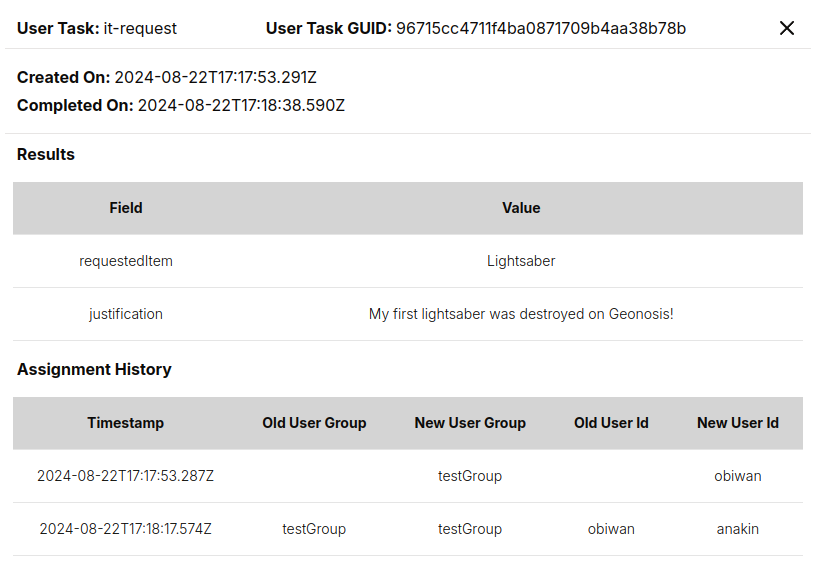User Tasks
This section is not a Developer Guide; if you want to learn how to Create a UserTaskDef, how to add a User Task Node to a Workflow, or how to handle User Tasks with GRPC, please check the appropriate docs in our developer guide.
This section focuses on concepts.
The purpose of a Workflow Engine is to coordinate processes that assign work. A TaskRun represents a unit of work assigned to a computer, but what about work assigned to a human? That's where User Tasks come in.
Motivation
You might ask, why not just use an ExternalEvent? Technically, it is possible to implement similar functionality using just ExternalEvents rather than introducing a whole new concept into the API. The reason for this is that so many things about User Tasks are tied deeply into the logic of the WfRun itself, including assignment, reassignment, cancelling, lifecycle, and even simply scheduling a User Task.
For example, the Dashboard allows you to see a history of when a UserTaskRun was assigned, and to whom it was assigned:

In short, User tasks handle workflow use-cases which require the input, decision-making, or expertise of an actual person. Some common examples of user tasks include:
- Workflow Approvals: Processes in which a specific person or group of people must review and authorize a business transaction.
- KYC: Know-your-customer workflows in which a sales rep must input information about a customer (eg. billing information) before the business process can continue.
- Data Input: Tasks involving filling out forms or providing specific information before the business process can continue.
- Manual Calculations: Situations that require human intervention to perform calculations, analyses, or assessments that cannot be easily automated and wherein we can't trust Chat GPT 😉.
The addition of the User Tasks feature allows LittleHorse to seamlessly automate workflows spanning humans and computers across multiple departments within an organization and beyond.
Schemas of User Tasks
In the LittleHorse API, User Tasks are represented and controlled by three objects:
- The
UserTaskDefobject defines the schema of... - The
UserTaskRunobject, which is created when aThreadRunarrives at a... UserTaskNodeobject, which is a type ofNodein aWfSpec.
When a person executes a User Task, he or she must fill out one or more pieces of information in a form somewhere (most often, this will be on a UI). The fields in these forms are defined by the fields of a UserTaskDef.
Using User Task Output
As discussed in the Workflow Concept docs, every step (i.e. Node) in a workflow returns some output, which can be used to modify a workflow Variable.
The returned output has the variable type JSON_OBJ, and individual fields can be accessed for variable mutations using the appropriate .jsonPath() methods in our SDK's.
For detailed tutorials on how to use User Tasks, check our WfSpec Development Guide and our grpc guide.
Users and Groups
A UserTaskRun may be assigned to either a user_id or a user_group. Both user_id and user_group are just plain Strings in LittleHorse, and are not validated with any external third-party identity provider (however, LittleHorse Enterprises LLC has a commercial product which connects User Tasks to an Identity Provider using the OIDC protocol).
User Task Lifecycle
An instance of a User Task (a UserTaskRun) is created according to a UserTaskDef specification when a ThreadRun arrives at a UserTaskNode. In plain English, when a Workflow Run gets to a "user task" step, we create a UserTaskRun and assign it to either a user_id, user_group, or both.
Users and Groups
A UserTaskRun may be assigned to either a user_id or a user_group. Both user_id and user_group are just plain Strings in LittleHorse, and are not validated with any external third-party identity provider (however, LittleHorse Enterprises LLC has a commercial product which connects User Tasks to an Identity Provider using the OIDC protocol).
At creation time, UserTaskRun are assigned to the user id or group id that is specified in the UserTaskNode. User Tasks in LittleHorse support automatic reassignment, reminder TaskRuns, automatic cancellation after a configurable timeout, and are also searchable based on their owner.
A UserTaskRun is an instance of a UserTaskDef assigned to a human user or group of users. Just like a TaskRun, the UserTaskRun is an object that can be retrieved from the LittleHorse API using lhctl or the grpc clients.
Like TaskRuns, the output of the UserTaskRun is used as the output of the associated NodeRun. In other words, the output of a USER_TASK node is a Json Variable Value with a key for each field in the UserTaskDef.
UserTaskRun Statuses
A UserTaskRun can be in any of the following statuses:
-
UNASSIGNED, meaning that it isn't assigned to a specific user. If aUserTaskRunisUNASSIGNED, it is guaranteed to be associated with auser_group, and theuser_idfield will be un-set. -
ASSIGNEDmeans that a task is assigned to a specificuser_id. TheUserTaskRunmay or may not have auser_group. -
CANCELLEDdenotes that theUserTaskRunhas been cancelled for some reason, either manually, due to timeout, or due to other conditions in theWfRun.CANCELLEDis currently a terminal state. -
DONEOnce a user execute a user task, it moves to the terminalDONEstate.
Lifecycle Hooks
Another useful feature of LittleHorse User Tasks are hooks which allow you to automate certain lifecycle behaviors of User Tasks when certain time periods expire.
Use-cases include:
- Re-assigning a User Task to a different user after a certain period of time expires.
- Sending reminders to users or groups of users after a certain time period.
- Releasing ownership of a User Task from a specific user to a group of users after a period of inactivity.
Check our WfSpec Development Docs to see how this works.